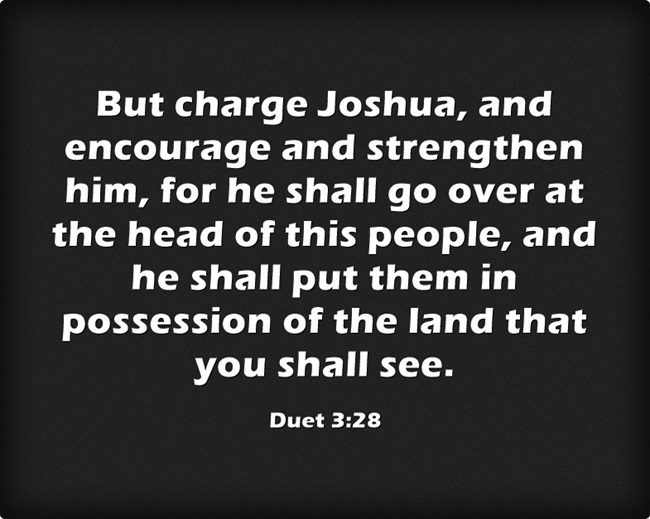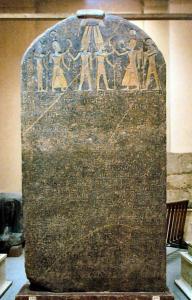Here is a Sunday school lesson or Bible study about Joshua.
Commanding Joshua
Deuteronomy 3:28 “But charge Joshua, and encourage and strengthen him, for he shall go over at the head of this people, and he shall put them in possession of the land that you shall see.”
While Moses was still God’s chosen leader, God told Joshua, “Your eyes have seen all that the Lord your God has done to these two kings. So will the Lord do to all the kingdoms into which you are crossing. You shall not fear them, for it is the Lord your God who fights for you’” (Duet 3:21-22) and when Joshua does begin to cross into the Promised Land, three times God encourages him like in Joshua 1:9 which says “Have I not commanded you? Be strong and courageous. Do not be frightened, and do not be dismayed, for the Lord your God is with you wherever you go” and “Every place that the sole of your foot will tread upon I have given to you, just as I promised to Moses” (Joshua 1:3). The point is, God charges or commands Joshua to be strong and courageous but then gives him sufficient cause to (Duet 1:3, 9; 3:21-22, 28). How encouraging.
Do you think Joshua ever had doubts?
Is Moses in the Promised Land today?
Is there an imperative command to not fear them, whoever or whatever “them is?”
From Moses to Joshua
Numbers 27:18 “So the Lord said to Moses, “Take Joshua the son of Nun, a man in whom is the Spirit, and lay your hand on him.”
Just after Moses was about to hand over the leadership of Israel to Joshua, in great humility Moses prayed “Let the Lord, the God of the spirits of all flesh, appoint a man over the congregation who shall go out before them and come in before them, who shall lead them out and bring them in, that the congregation of the Lord may not be as sheep that have no shepherd” (Num 27:16-17) and God did just that, saying Joshua was the man in whom the Spirit is and as a symbol of authority and commissioning of Joshua, Moses was to lay hands on him. Instead of complaining that Moses was not going to be able to enter the Promised Land, Moses sought the will of God.
Why was Moses not allowed into the Promised Land (Num 27:14)?
Who does the appointing of leadership?
Why do you know about Joshua that makes you think he qualifies to take over for Moses?
God with Joshua
Deuteronomy 31:3 “The Lord your God himself will go over before you. He will destroy these nations before you, so that you shall dispossess them, and Joshua will go over at your head, as the Lord has spoken.”
When the time came for Israel to cross over, God says to Israel, He “will go over before you” which clearly means God will fight for them, before they even get there so they can be “strong and courageous. Do not fear or be in dread of them, for it is the Lord your God who goes with you. He will not leave you or forsake you” (Duet 31:6) and as a final, inspirational encouragement, “Moses summoned Joshua and said to him in the sight of all Israel, “Be strong and courageous, for you shall go with this people into the land that the Lord has sworn to their fathers to give them, and you shall put them in possession of it. It is the Lord who goes before you. He will be with you; he will not leave you or forsake you. Do not fear or be dismayed” (Duet 31:7-8).
What key words were repeated in Deuteronomy 31:3-8?
What does God mean by telling Israel, “Joshua will go over at your head”?”
How would God possibly destroy them or go before them for Israel?
Crossing over with Joshua
Deuteronomy 31:7 “Then Moses summoned Joshua and said to him in the sight of all Israel, “Be strong and courageous, for you shall go with this people into the land that the Lord has sworn to their fathers to give them, and you shall put them in possession of it.”
At the end of Moses life, just before he was buried by the Lord Himself, Moses again gives Joshua and all Israel instructions and commands them to be strong and courageous because God had promised their fathers that they would possess the land and it was about to come to fulfillment. The “fathers” include Abraham, Isaac, Jacob, and the Twelve Tribes of Israel. Near the end of Moses’ life, “the Lord commissioned Joshua the son of Nun and said, “Be strong and courageous, for you shall bring the people of Israel into the land that I swore to give them. I will be with you” (Duet 31:23).
What qualities in Joshua made him a good leader?
Did God expect Israel to obey in the Promised Land (Duet 31:16-18)?
Why did God bury Moses in an unknown location (Duet 34:5-6?
Conclusion
I urge you in your study to look at all of the Bible verses and read them aloud in the class so that you can get the most out of this lesson on Joshua who was God’s choice to take Israel into the Promised Land. Joshua and Jesus’ names are very similar and both mean salvation, just as there is salvation in no other name that we’ve been given but Christ (Acts 4:12). You are responsible for what you believe and what you choose to not believe. Jesus shows all of us, our only two choices; “Whoever believes in the Son has eternal life; whoever does not obey the Son shall not see life, but the wrath of God remains on him” (John 3:36).
Is there a church leader you know like Joshua?
Do you see any of Joshua’s traits in you or someone else?
What has changed in your understanding about Joshua in this study?
Article by Jack Wellman
Jack Wellman is Pastor of the Mulvane Brethren Church in Mulvane Kansas. Jack is also the Senior Writer at What Christians Want To Know whose mission is to equip, encourage, and energize Christians and to address questions about the believer’s daily walk with God and the Bible. You can follow Jack on Google Plus or check out his book Teaching Children the Gospel available on Amazon.












